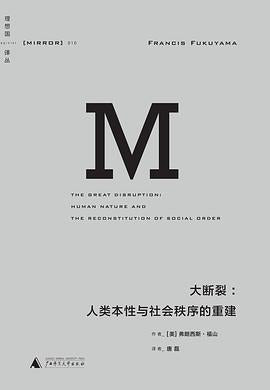WULOLIFE
《大断裂:人类本性与社会秩序的重建》作者: [美] 弗朗西斯·福山 出版社: 广西师范大学出版社
《大断裂:人类本性与社会秩序的重建》作者: [美] 弗朗西斯·福山 出版社: 广西师范大学出版社
Couldn't load pickup availability
Description
内容简介 · · · · · ·
【编辑推荐】
★梁文道、刘瑜、熊培云、许知远联袂主编——“理想国译丛”(MIRROR)系列之一( 010)——保持开放性的思想和复杂性。本书有刘瑜专文导读“西方的危机?”。★《大断裂》是一部不但重要,还有野心的作品。它试图在保守派和自由派之间搭建起一座桥梁,从而给陈腐不堪且风格化的争论注入活力并使讨论更为贴近现实。——美国著名政治作家弗吉尼亚?波斯特尔(VirginiaPostrel)★在有自由的地方,社会危机通常总有出路,因为自由允许并鼓励试错与纠错,从而避免了故步自封。与其说是一种幸灾乐祸的“唱衰”,不如说是一种居安思危的警报。福山的《大断裂》也同样如此。——刘瑜(清华大学政治学系)
【内容简介】
《大断裂:人类本性与社会秩序的重建》二十世纪中叶以降,西方主要发达国家相继迈入了所谓的后工业时代,在这一时期,以信息技术为核心的技术进步给经济和社会的传统运行模式和组织方式带来了重大的改变,旧有的社会规范和文化价值也遭到严重的冲击,在西方发达资本主义社会普遍表现为犯罪率、离婚率、未婚生育率的大幅下降和社会信任度的明显降低,福山将此种种与“社会资本”有关的指标的恶化现象总结为“大断裂”。究竟何种原因导致了发达社会大断裂的出现?这是否是资本主义社会转型不可避免的宿命?它们又是如何走出大断裂的?本书对上述问题进行了探索。在福山看来,资本主义社会中,个人主义的不断膨胀尽管造了传统权威和社会规范不同程度的消解,但基于个体理性和竞争关系自发产生的互惠利他合作仍然是形成各种形式社会联结和社会资本的基石。在新技术条件下,社会组织结构的扁平化促成了社会网络的兴起,使得社会资本对于构建社会秩序的重要福山相信,即使面临技术、经济和社会的重大转型,社会秩序始终都会在既有等级制又有自发性的源泉中产生。大断裂不可避免,但社会规范的重建也始终可期。他列举了20世纪90年代以后,发达资本主义社会的大断裂乱象逐渐消退、社会资本重新积累的若干证据,对此结论进行了说明。在本书中,福山一如既往地对资本主义社会及其制度表示了信心。他认为,现时代的后工业资本主义经济会产生对社会资本的持续需求,它也有能力提供足够数量的社会资本以满足其需求。他甚至对技术发展能够帮助人类生活实现人的整全性表示出乐观。在社会和道德领域表现出的历史周期性,需要也终将通过人类自身重建社会秩序的强大能力来克服。
